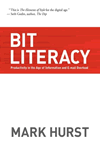Bit Literacy
by Mark Hurst
The central tenet of Mark Hurst's book is the belief that the key to happiness and personal effectiveness is an empty e-mail inbox. I find this remarkable. Why does my inbox matter at all? And why is it more important than a clean desk, or a neatly-made bed, or a shiny sink? The extraordinary weight he attaches to the inbox lies, I think, in a particular emotional significance with which he invests incoming messages; to Hurst, each unfiled email represents a nagging reminder of promises unmet and obligations unfulfilled.
To me, each email message is an email message, signifying nothing in particular beyond what it says. (An unread email, like a ringing telephone, is another thing entirely, of course. It might say anything. It might carry wonderful news, or it might announce a crisis that must be dealt with at once. Whatever it is, if the message can be read it cannot be ignored.)
So, the core lesson of the book addresses a concern that simply isn't mine and that lies, I think, in Hurst’s past rather than in any essential quality of email. Is it wrong to be so emphatic over the desirability of the well-scrubbed inbox? It is not. I have, for example, no difficulty leaving a dirty dish in the sink overnight. I know people who couldn’t do that, who would never be able to sleep with the guilty knowledge of that unwashed dish. I think my attitude is perfectly defensible, I am happy to confess that it's probably better to wash the dishes, and I think we all can agree that it's all personality, not morality.
Hurst has good ideas about ToDo lists, often closely related to David Allen’s Getting Things Done. Hurst does believe every ToDo should have a date, and I have argued elsewhere that it's best to keep ToDo's off your calendar. Some details in late chapters are dubious — a weird diatribe against Word files for storing too much information, for example, is simply an expression of distrust for Microsoft which might well be justified but which is not properly argued. Occasional details are not quite right: treating AAC as an Apple-inspired DRM conspiracy is simply a mistake, and arguing for ASCII as an open alternative to Word files is silly. (The underlying idea that business people would benefit from calling of the typography arms race in internal reports and presentations by limiting everyone to plain Unicode text is attractive and is probably what Hurst really means, but it's not what he says.) Little here will be very new to people who are comfortable with computers, and the book seems unlikely to fall into the hands of people who aren’t.
Still, I found two very useful ideas in the book. First, Hurst urges everybody to grab a keyboard accelerator — he calls them "bit levers" — to save typing. That makes sense to me, although I had never tried one. I grabbed TextExpander right away. Second, the book makes an interesting if tangentially-argued case for giving an email account to your software applications, so you could send or forward them email that they could then process on their own. I like the idea of being able to email my Tinderbox planning document or my marketing plan.
Two intriguing ideas in a slender readable book makes a good experience, even though they're probably not the ideas that the author had in mind.
